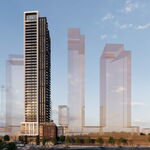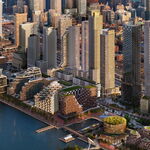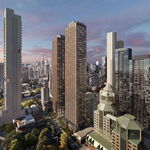I'm skeptical. There is plenty of highway congestion in the suburbs, caused by people driving from one suburb clear across the city to another suburb. I don't think it matters what the origin/destination is. Where there is congestion, there should be time of use tolls. If you check out that TCSA report, they mention LA's experience with toll lanes, which actually handle double the volume per lane than 'free' lanes. Even modest tolls might help improve the performance of these highways, benefiting the users and society as a whole. I wonder what difference there is in performance of the 407 vs the 401 in peak lane capacity/throughput.
There is a significant portion of non-core orientated peak traffic. However, it's the core-orientated peak traffic that causes the worst congestion currently. Individual intersections are overloaded and create a feedback loop from which the system cannot recooperate for hours. If you've crawlled down the DVP in the morning, you might have noticed the traffic pulsing at Lawrence and Eglinton because of the lights.
Time of use tolling gives priority to non-discretionary trips during peak hours. It doesn't really affect trips that people "have to make", which if you are sitting on the DVP or Gardiner at 8:45 AM is probably the case.
What's very long run? I'd call it medium term, with effects seen in terms of moving closer to work or working closer to home within 2 - 3 years of implementation. I was referring to off-peak highway usage. The goal of time of use tolling isn't to drive off-peak transit usage.
What is the goal of time of use tolling if not to increase off-peak usage while relieving peak usage? If more people are travelling off-peak, then off-peak transit should increase accordingly, no?
I don't think taxing parking spots would work in reducing congestion on highways like the 401 or 407. These highways carry substantial inter-suburb traffic, and unless you're taxing these suburban parking spots, you do nothing to deter these trips. In fact, I'd characterize parking tax as having only a weak effect on congestion, as it utterly fails to take into account distance driven.
Taxing parking is to shift the price point between public and private transport. It doesn't reduce congestion directly, but reduces congestion by shifting demand from private to public transport. I see it as a "and also" rather than a seperate solution to congestion.
I'm not advocating tolls in the absence of congestion as a way to reduce congestion--that is totally illogical. I'd be open to a flat toll proportional to the cost of the infrastructure, but I expect this would be low (5 or 10 cents per km). This could be applied through a odometer tax at plate renewal time. I would even support these replacing gasoline excise taxes and flat plate taxes. The latter especially is pointless in reducing congestion as it is totally insensitive to amount of use. Fuel excise taxes under-burden fuel efficient (and future electric) cars for their impact on infrastructure. And promising to reduce gasoline prices by 15 cents a litre might make the medicine go down a bit easier. If we're to tax gasoline, it should be through a carbon tax. A gas tax is a foolish way to pay for transportation infrastructure.
Sounds like London's Emissions-based Registry Tax. If all you are doing is shifting from one tax to another, you aren't going to effect overall usage only the specific usage composition.
I don't particularly like the model London has gone with. It reduces the number of cars in the downtown area, but does nothing to reduce highway congestion.
Any congestion reduction in London is theoretical. Within three months of tolling, usage was back above pre-toll levels. Unless people have an affordable alternative (because people won't turn to an unaffordable alterative), they have no choice, but to continue in their existing patterns.
Whether or not residents can afford the toll or have a transit alternative is immaterial. The goal is to reduce highway congestion, and transit is only one alternative. People can choose shorter commutes, off-peak driving, or carpooling. We are never going to have adequate transit. But we sure as hell are going to have ungodly amounts of gridlock. It's because we have built our cities around consuming finite resources as if they were forever abundant. Every year we go without putting prices on our scarce resources is another year we increase our dependence on a doomed model of urban development. It's going to be painful now, but it will hurt a lot more later. And we'll be paying a toll one way or another: it will either be paid in dollars or time. When it's paid in dollars, at least society benefits, rather than turning our highways into giant value-incinerators.
Affordablity of a toll directly relates to the extent of the tolls congestion reduction effect. A $100 per km toll would pretty well ensure that you'd never be impeded by another driver. A $0.01 per km toll would pretty well ensure that you don't give a damn about it and will use the road anyway. I own a private vehicle, but I do not want to, but for my job it's the only transportation option in many places. If and when there is public transit available to when and where I need it, I use it. When there isn't, I have to drive.
What about that is immaterial to the discussion? There are many congestion-combating methods, but how, where, why, and when people are travelling and meeting those needs seems to me to be the core issue.




